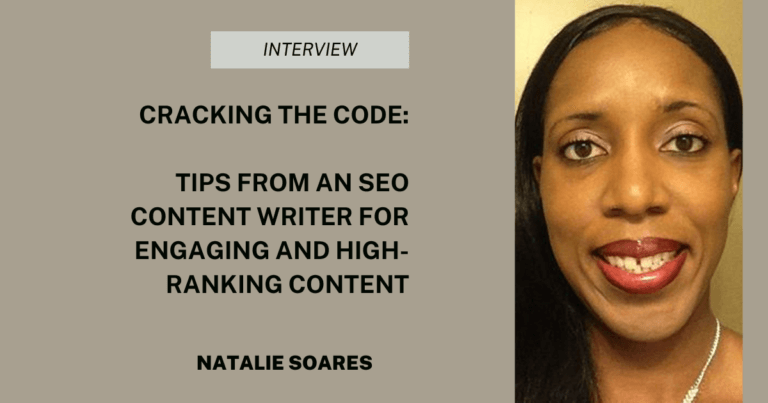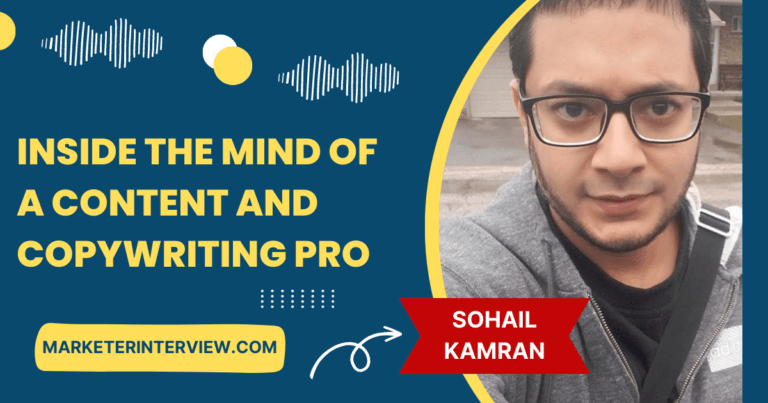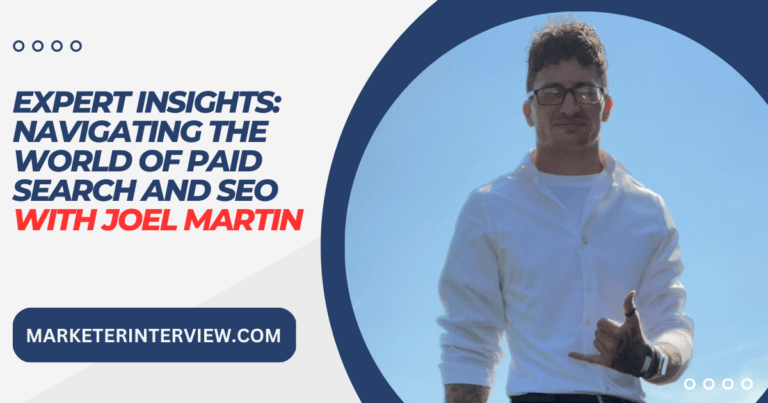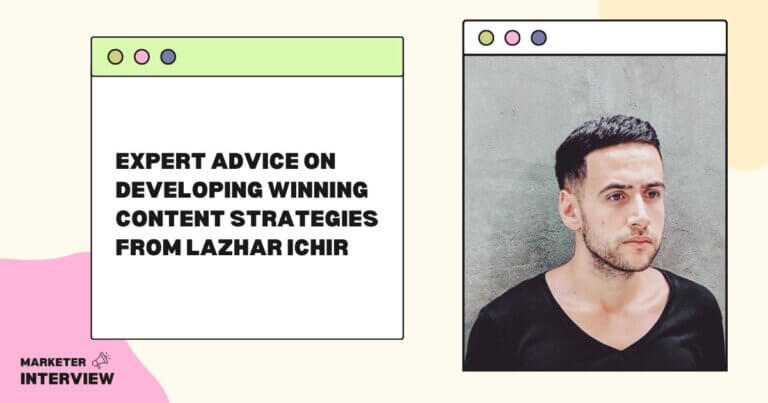Empowering Marketers: A Conversation with Balaji Thiyagarajan
Welcome to Marketer Interview, the go-to blog for insightful conversations with top-notch marketers.
In this edition, we have the pleasure of speaking with Balaji Thiyagarajan, a Senior Digital Marketing Lead at Kovai.co, with over 13 years of hands-on experience across various domains.
Balaji has worked with Fortune 500 companies and globally recognized brands such as Volkswagen, Berkshire Hathaway, Nuvance Healthcare, and Xero. He often writes on his blog at DigitallyAmplified.com.
Balaji’s expertise lies in Google Ads, SEO, Linkedin Marketing, Content Marketing, and Project Management.
With a passion for mentoring and creating new marketers, Balaji has a remarkable track record of driving revenue month after month in the complex B2B SaaS marketing world.
Let’s delve into the fascinating journey and career of Balaji Thiyagarajan and discover the insights and wisdom he has gained throughout his remarkable marketing career.
Contents
- 1 Can you tell us how you initially got into marketing?
- 2 Could you highlight critical milestones or turning points significantly shaping your career?
- 3 B2B SaaS marketing is known for its complexity. How do you approach this complexity?
- 4 Google Ads, SEO, Linkedin Marketing, and Content Marketing are among your areas of expertise.
- 5 Please provide us with valuable insights or best practices for each domain.
- 6 What advice would you give to someone just starting a digital marketing career?
- 7 How do you effectively manage projects, ensuring smooth execution and successful outcomes?
- 8 How have you adapted your marketing strategies to cater to different sectors?
- 9 What are some emerging trends or technologies that marketers should pay attention to?
- 10 Please share some of the tools and software you rely on to streamline your work processes and enhance your marketing efforts.
- 11 As a seasoned marketer, what are your goals for the future, both in terms of personal growth and making an impact in the marketing industry?
Can you tell us how you initially got into marketing?
In the final years of my M.S. degree, I dreaded pursuing a coding job. During this time, 2G internet was just starting to take off in India.
I stumbled upon an SEO internship opportunity on a freelancing platform for a mattress company based in the UK. Without hesitation, I applied for an internship position and got selected.
As an intern, I was exposed to various aspects of the business, from customer service to marketing and product development. Every day brought new challenges and learning opportunities.
I worked closely with the SEO team, collecting data, creating Excel reports, and Implementing link-building and on-page campaigns.
What started as a part-time internship soon turned into a full-time position. As a result, I became an integral part of the team, utilizing my IT background to improve the company’s online presence and streamline its operations.
Could you highlight critical milestones or turning points significantly shaping your career?
As a digital marketer at a university, I was tasked with increasing the number of admissions for a particular department from 500 to 2000.
This project played a crucial role in shaping my career and taking it to new heights. Instead of solely focusing on improving the ranking of the university’s website, I set a goal to capture 90% of the first page results for keywords that showed high interest.
I learned about digital PR, viral marketing, and influencer marketing to achieve this. I utilized these strategies to take advantage of mentions and backlinks from well-known websites worldwide.
Fast forward 8 months, and our team successfully received more than 4500 admissions for that department, surpassing our target by 2.5 times.
This project was a significant learning experience for me, filled with continuous growth, knowledge acquisition, and adaptation. It completely transformed the way I approach ambitious projects, and it’s an experience I will never forget.
B2B SaaS marketing is known for its complexity. How do you approach this complexity?
B2B SaaS marketing is undoubtedly a complex landscape, akin to navigating through a maze of intricacies.
In my experience, B2B marketing requires meticulous attention to detail and a strategic approach that leaves no room for error.
Allow me to shed some light on my approach to this complexity and the strategies I’ve found most effective in consistently driving revenue:
First and foremost, in the world of B2B marketing, precise positioning is paramount. It’s crucial to clearly define your brand’s unique value proposition and target audience.
Without a crystal-clear understanding of your positioning, you risk squandering valuable resources and diluting your message.
I emphasize the importance of honing in on your niche, conducting thorough market research, and crafting a compelling brand narrative that resonates with your target customers.
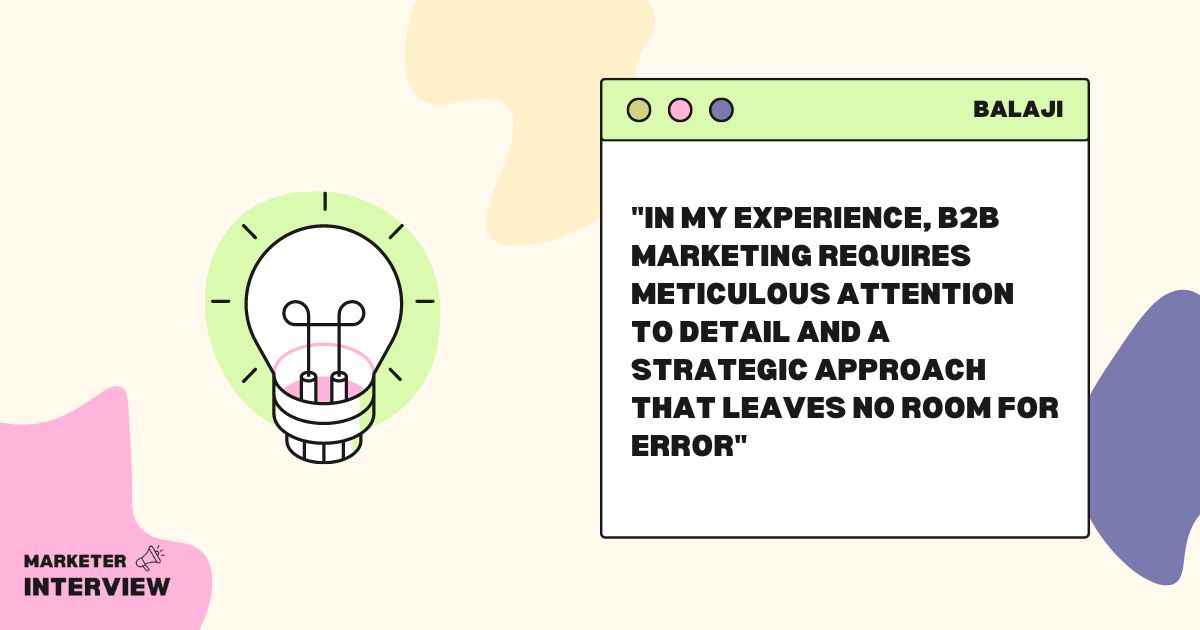
Regarding SEO, I advocate for a proactive approach to monitoring the search terms driving traffic to your website.
Utilizing tools like Google Search Console, I closely analyze the keywords and phrases attracting visitors. If incorrect or irrelevant terms are creeping into the mix, swift action is necessary to realign your site’s positioning and reclaim your target market. By staying vigilant and responsive, you can ensure that your SEO efforts align with your overall B2B marketing strategy.
In the realm of PPC, a meticulous approach is paramount.
While B2B campaigns may often have lower search volumes, it’s essential to recognize the potential for attracting irrelevant search terms. Therefore, I emphasize the need for daily scrutiny and monitoring of search term reports within PPC campaigns.
This allows precise control over the keywords triggering your ads and enables swift optimization to weed out irrelevant or low-converting terms. By maintaining a microscopic eye on PPC campaigns, you can maximize the effectiveness of your budget and drive revenue from qualified leads.
Furthermore, in B2B SaaS marketing, nurturing leads and building solid relationships is essential for driving consistent revenue. Therefore, I prioritize tactics such as email marketing campaigns, personalized outreach, and thought leadership content to engage with prospects throughout their buying journey.
You can build trust, nurture leads, and drive revenue from loyal customers by delivering valuable insights, addressing pain points, and showcasing your expertise.
To summarize, my approach to tackling the complexity of B2B SaaS marketing centers around precise positioning, proactive SEO management, dynamic PPC optimization, and effective lead nurturing.
By leveraging these strategies, I aim to drive consistent revenue by aligning marketing efforts with the needs and expectations of target customers.
B2B marketing may be intricate, but navigating this complexity and achieving remarkable results is possible with a strategic mindset and a commitment to excellence.
Google Ads, SEO, Linkedin Marketing, and Content Marketing are among your areas of expertise.
Please provide us with valuable insights or best practices for each domain.
Google Ads:
When it comes to optimizing Google Ads, there are two fundamental principles I firmly stand by.
Firstly, measure twice before you cut. Making changes without proper planning and sound reasoning can harm a well-performing campaign.
Always ensure you have strong reasoning behind any adjustments, even based on intuition. Valuing your decisions with calculated risks is crucial to avoid negative consequences.
SEO:
In the age of AI, the approach to SEO has undergone a radical transformation. Simply relying on lengthy articles and building high-authority links is no longer enough to succeed.
You must skillfully blend publicity and digital PR to run a successful SEO campaign. However, you can stand out in the competitive digital landscape by incorporating these elements.
LinkedIn Ads:
If you want to make LinkedIn Ads work effectively for B2B marketing, two factors stand out: reach and frequency.
With a platform that caters specifically to professionals, ensuring your ads reach the right audience and are consistently visible is crucial.
By optimizing reach and frequency, you can maximize the impact of your LinkedIn advertising campaigns and increase the likelihood of capturing valuable B2B leads.
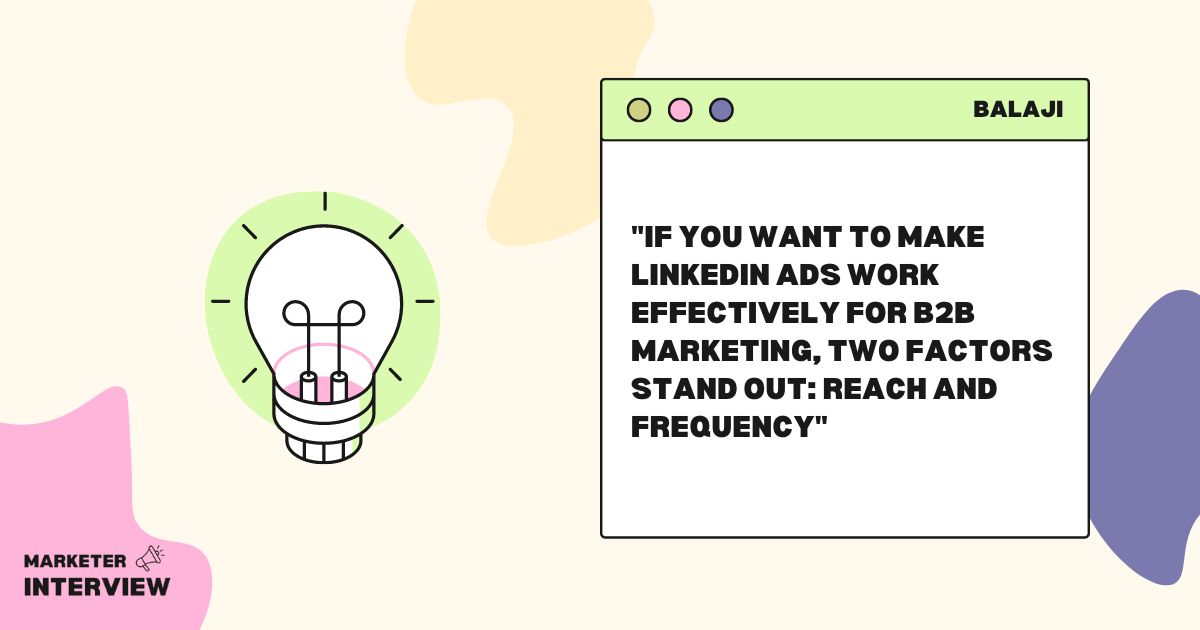
Content Marketing:
Value delivery is the essence of effective content marketing. If your messages fail to provide value to your B2B audience, they will perceive your brand as shallow and irrelevant.
It’s imperative to constantly deliver meaningful and insightful content that aligns with your audience’s pain points and addresses their needs. Maintaining this commitment to value will safeguard your brand image and reputation over the long term.
Remember, in the dynamic world of digital marketing, it’s crucial to adapt and evolve your strategies to stay ahead. By adhering to these principles and embracing the ever-changing landscape, you can optimize your marketing efforts and achieve success in the digital realm.
What advice would you give to someone just starting a digital marketing career?
As a mentor who is passionate about nurturing aspiring marketers, I would offer the following advice to someone embarking on a career in digital marketing:
Beyond mastering marketing skills, developing strong analytical abilities and a resilient mindset is essential.
In the dynamic realm of digital marketing, you’ll often encounter challenges and unexpected situations that require quick thinking and adaptability. In addition, what may work today could become obsolete tomorrow, so staying agile and embracing a mindset of continuous learning and innovation is crucial.
One of the critical traits of a successful digital marketer is the ability to navigate through uncertainties and setbacks.
It’s not uncommon for projects to fall short of expectations. Resilience is vital. Bouncing back from disappointments and setbacks with a positive attitude is crucial. Embrace these moments as opportunities to learn, iterate, and develop innovative solutions.
Additionally, digital marketing is a field that requires you to think beyond the conventional syllabus. It demands creative problem-solving skills and the ability to tackle questions and challenges that may have more complex answers.
Being open to exploring new ideas, thinking outside the box, and embracing innovative approaches will set you apart and help you thrive in this ever-evolving industry.
How do you effectively manage projects, ensuring smooth execution and successful outcomes?
Project management is indeed a critical element of successful marketing campaigns. To ensure smooth execution and achieve desired outcomes, I employ effective strategies tailored to the specific setting, whether in an agency or in-house environment.
In an agency setting, expectation mapping plays a pivotal role. It is essential to strike a balance between client expectations and realistic deliverables. I establish a transparent and trust-based relationship with clients by avoiding overpromising and under-delivering.
Clear communication about project scope, timelines, and potential challenges is crucial. Regular updates and proactive client engagement help manage expectations and build strong collaborative partnerships.
In an in-house setting, upfront communication is the key to smooth project management. Therefore, I prioritize open and honest dialogue with stakeholders at all levels.
By consistently sharing project progress, including successes and challenges, I foster an environment of transparency and trust. This proactive approach enables me to promptly address any obstacles or concerns, keeping the project on track and ensuring the timely delivery of results.
Regardless of the setting, effective project management demands clear and consistent communication. By actively engaging with all relevant parties, I facilitate a seamless flow of information and create opportunities for feedback and alignment. \
This approach minimizes the risk of misunderstandings or delays and fosters a collaborative environment where everyone is invested in the project’s success.
How have you adapted your marketing strategies to cater to different sectors?
In the last 12 years, every quarter has brought forth new changes and accompanying challenges.
These include algorithm updates, the emergence of new competitors, lost rankings, shifts in search trends, and changes in the SERP, among others. The list goes on.
While these changes can be draining and demanding, it is crucial to keep progressing and stay ahead to uncover what lies ahead. Ultimately, this process leads to finding practical solutions that yield better results than before.
Throughout this journey, I have been conscious of separating experiments from optimizations. It is important to avoid mixing and matching these two when the stakes are high.
I used to construct honey pot sites to experiment with my hypotheses. If they proved successful, I would then implement them in live projects.
Fortunately, I had the opportunity to experiment in this manner, but anyone can utilize the free tools available in the market to do the same.
What are some emerging trends or technologies that marketers should pay attention to?
There are several emerging trends and technologies that marketers should keep a close eye on, as they have the potential to impact the future of the industry significantly.
Firstly, voice search is rapidly gaining popularity with the increasing adoption of smart speakers and voice assistants. Therefore, optimizing content for voice queries and understanding natural language processing will become crucial for marketers to ensure their websites are easily discoverable in voice search results.
Secondly, artificial intelligence (AI) and machine learning (ML) revolutionize how marketers analyze data and automate processes.
AI-powered tools can provide valuable insights for keyword research, content optimization, and personalized user experiences. As a result, marketers who embrace AI and ML will have a competitive edge in understanding consumer behavior and delivering targeted campaigns.
Furthermore, mobile optimization remains a key focus. With most online searches now happening on mobile devices, ensuring websites are mobile-friendly and load quickly is vital for user experience and search engine rankings.
Additionally, the rise of mobile and progressive web apps offers opportunities for marketers to engage users through personalized experiences and push notifications.
Another significant trend is the increasing importance of user experience (UX) and website performance. Search engines prioritize websites that provide a seamless browsing experience, including intuitive navigation, fast loading times, and mobile responsiveness. As a result, marketers must optimize their websites to deliver exceptional UX and improve overall performance.
Lastly, the impact of data privacy regulations and consumer preferences for transparency must be addressed. Marketers must prioritize user privacy and ensure compliance with regulations like the General Data Protection Regulation (GDPR).
Building trust with consumers through transparent data practices and personalized yet privacy-conscious marketing strategies will be vital.
Most SEOs are familiar with mainstream tools such as SEMrush and Ahrefs.
However, I want to emphasize the importance of utilizing Looker Studio and Power BI. By mastering these tools and leveraging them to streamline SEO, PPC, and content marketing performance reporting. As a result, you can make impactful decisions.
Looker Studio, in particular, offers extensive capabilities for visualizing and deriving meaningful insights from data, enhancing the decision-making process.
As a seasoned marketer, what are your goals for the future, both in terms of personal growth and making an impact in the marketing industry?
For the past four years, I have been highly engaged in assisting young individuals in pursuing careers in digital marketing. I actively contribute to their training and development, nurturing them to excel in the field.
Additionally, I am involved in creating a website where I share free templates for SEO, PPC and for those startups looking for fractional CMO.
I aim to foster at least 100 digital marketers’ growth by 2025 and help them secure fulfilling employment opportunities.

